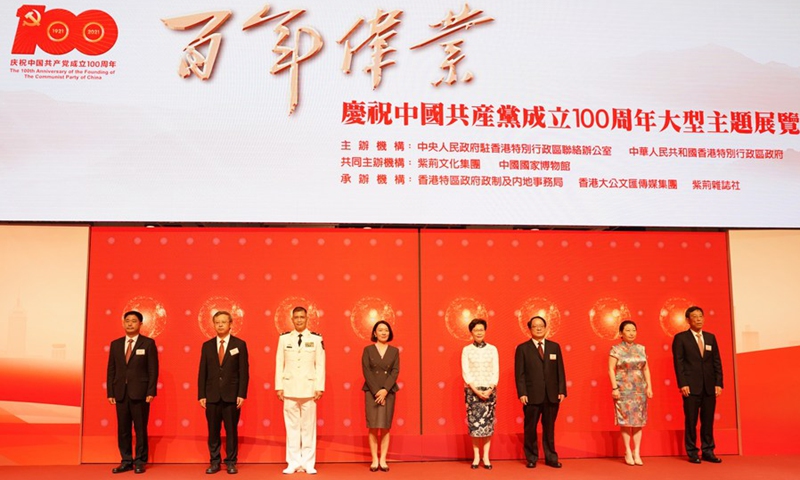
Chief Executive of the Hong Kong Special Administrative Region Carrie Lam (R4) attends the opening ceremony of an exhibition on the history and achievements of the Communist Party of China (CPC) in Hong Kong, south China, July 3, 2021. (Photo: Xinhua)
Two years ago, the Pearl of the Orient- Hong Kong was still in a social turmoil after protesters took to the streets and used the public's misunderstanding of the Communist Part of China (CPC) to incite hatred. Now after a year-long implementation of the National Security Law, the city continues to shine with its unique charm and has started to absorb more advantages and modern elements to make it better.
A safer guaranteeCherry - a vlogger with more than 1.64 million followers on Douyin, the Chinese mainland version of TikTok - told the Global Times that before the implementation of the National Security Law in June 2020, she was concerned that her appearance on Douyin might cause some trouble for her as she has found that some people started to research her real identity on Facebook and try to make trouble for her in real life. But now she feels very safe thanks to the law.
Jacky Ko, a key opinion leader who runs a multimedia production studio in Hong Kong, told the Global Times that he also feels that the National Security Law has protected his safety. As he does not agree with the protesters' opinions and actions, he often condemns them in public.
"Now I do not need to be afraid of being attacked on the streets by these rioters," he said.
Ko, as well as other Hong Kong residents, still remembered the chaos in the city before the law.
Vincent Poon, chairman of the Committee of Professional Services of the Y.Elites Association, told the Global Times that besides residents' daily life, many stores and restaurants were often harassed by rioters because, at that time, these rioters had few things to fear.
Poon said that he invested in science and technology businesses in Hong Kong after graduating from the US.
"The implementation of the National Security Law has stabilized our confidence in Hong Kong's investment prospects, provided international protection for assets in Hong Kong and effectively enhanced the image of the city," he said, explaining how he sees the law as a helping hand for his industry.
According to a report from China News, the number of crimes in Hong Kong in 2019 had increased by 9 percent from before the "rioters' storm," and it increased by another 7 percent in 2020. However, in the first quarter of 2021, crime dropped by 10 percent.
The crime rate for the six-month period after the law was implemented dropped by 4 percent from the six months before, including arson cases decreasing by 80 percent and sabotage cases decreasing by 40 percent.
Unchangeable nature
To celebrate Thursday's CPC centennial, Ko and several web celebrities in Hong Kong gathered under the Hong Kong Observation Wheel at AIA Vitality Park in Central district to sing the Chinese national anthem and wave the Chinese national flag.
"Some Hongkongers might look a bit of indifferent, but in fact they are very enthusiastic and have always had patriotic hearts," said Cherry and she posted a Douyin video featuring boats in Victoria Harbour decorated with banners saying "celebrating the CPC centennial" that have gained millions of likes.
"We are finally able to celebrate the big days outside happily this year, like the 100th anniversary of the founding of the CPC on July 1, the return of Hong Kong to China and the National Day on October 1," Ko added.
They congratulated the CPC loudly in front of the cameras at the park. According to photos sent to the Global Times by Ko, some people wore T-shirts printed with the sentence "Stop interfering in China's internal affairs" in both Chinese and English.
"The National Security Law for Hong Kong has never affected my freedom to speak up. I still can release articles and video clips on my social media account to criticize some works and measures of the Special Administrative Region (SAR) government," Ko said.
"Hong Kong is still a big multi-cultural city as it has continued embracing everyone from various racial backgrounds," Cherry added, noting that she can still see a lot of people from different countries working in the city.
Better development Recently, Cherry participated in the Miss Hong Kong Pageant, an annual beauty pageant organized by local Hong Kong television station TVB.
Cherry said she did not see any changes to the traditional program, but one interesting moment for Cherry was when one judge asked her if she had any connection to the Chinese mainland, such as whether she had studied in the mainland.
"I think this is a new judging criterion for this year's program, and I guess those who are from the Chinese mainland might have extra points in that column," she said.
Cherry said she feels many industries in Hong Kong have imitated the mainland to catch up with the rapid developments there.
"Our colleagues have changed from using What's app and Facebook to WeChat and Xiaohongshu for communication. And QR codes, Wechat pay and Alipay are used everywhere in the city, even by many vendors in Tsim Sha Tsui. Many of my friends like to shop on Taobao as the products are cheaper…"
She added that due to the COVID-19 pandemic, the drivers in Hong Kong lost a lot of business, so they have followed in the footsteps of drivers in the mainland to work for many Uber-like apps simultaneously.
"I think Hong Kong has begun to absorb many advanced trends from the mainland, and I believe it will become better," said Cherry.




